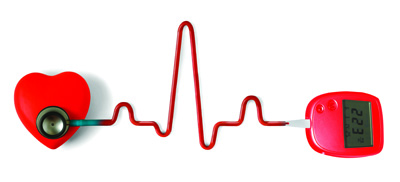 |
| Source: www.healthdoctrine.com |
It is notable that two out of three people with diabetes die from heart disease. The link between the two ailments is strong and significant, and a close eye should be kept on symptoms so that a diabetic patient—or anyone at risk for heart disease—does not become another statistic. At every turn, cardiovascular disease, especially cardiovascular death, stalks the patient with diabetes.
When matching individuals with diabetes to non-diabetes in heart disease studies, those with diabetes have always fared worse. Diabetes has garnered even more recognition off-late, particularly with the new data indicating that the risk of cardiovascular disease events in people with diabetes may be higher than once believed. Identifying the augmented incidence and prevalence, diabetologists have focused on examining the correlation between diabetes and cardiovascular risk, methods to counter the disease, and a means by which to educate the public regarding the devastating effects of the disease.
The diabetic risks associated with heart disease include high blood pressure, high bad (LDL) cholesterol, high triglycerides, low good (HDL) cholesterol, smoking, obesity, poorly controlled blood glucose levels, and lack of physical activity. Many more ailments exist that can affect many parts of the body and can lead to serious complications, including blindness, kidney disease, nervous system disorders, periodontal sickness, amputations, and complication of pregnancy and many more.
Heart and Stroke Risk Factors for People with Diabetes:
• High blood pressure
• Lipid disorders
• High LDL cholesterol
• High triglycerides
• Low HDL cholesterol
• Smoking
• Obesity
• Lack of physical activity
• Poorly controlled blood glucose
Controlling risk factors is the single most important way to suspend or even prevent the onset of cardiovascular disease and stroke in diabetes patients. Diabetologists in East Delhi are apprehending many more techniques to fend off diabetes and heart attacks. Controlling glucose as a means of lowering the risk of cardiovascular disease has become controversial recently in light of the recently released ACCORD, ADVANCE, and VADT results. 1 – 3 Despite the results of these studies, which indicate that intensive glucose management had no greater benefit than conventional glucose control did or, with ACCORD, had worse outcomes, there are some key points to keep in mind that may help direct the decision on how tight to control blood glucose.
0 comments:
Post a Comment